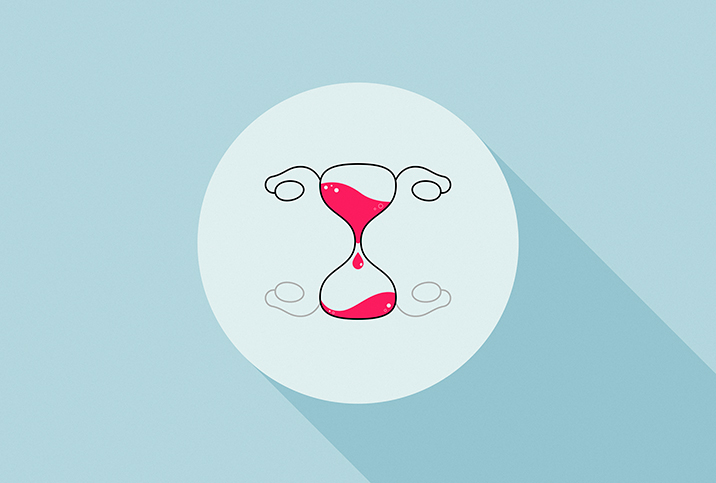Supporting Your Bone Health Is Essential After Menopause

Menopause marks the end of fertile years for people with ovaries and usually occurs between ages 45 and 55 (the average age is 51 in the United States). During the menopausal transition, the ovaries' function starts to wind down, lowering estrogen and other hormone levels.
New and often unwelcome side effects can occur as hormone levels drop. Some of these effects are obvious—hot flashes and mood swings—but others are less apparent and happen more gradually with a lasting impact on your physical health.
Postmenopause is associated with an increased risk of osteoporosis. Of the estimated 10 million people in the United States with osteoporosis, 80 percent are women. Even more shocking: Roughly half of women older than age 50 break a bone because of osteoporosis.
Although one culprit is naturally smaller and thinner bones for women, a sharp drop in bone-protecting estrogen is a significant factor.
Postmenopausal calcium recommendations
Although there's more to bone loss prevention than a single mineral, calcium is well known for its role in bone health, and postmenopausal women should ensure they get a sufficient amount.
"For women who are not taking estrogen, it is recommended to get 1,500 milligrams of elemental calcium per day. For women taking estrogen, 1,000 milligrams of elemental calcium is necessary because estrogen increases absorption of calcium from the GI tract," said Nanette Santoro, M.D., a professor and the E. Stewart Taylor chair of obstetrics and gynecology at the University of Colorado.
The National Institutes of Health (NIH) recommends an intake of 1,200 mg of calcium daily for women age 51 and older, which is higher than the recommendation of 1,000 mg daily for younger women.
Dietary sources compared to supplements
Calcium intake can come from your diet, a supplement or both.
"It is better, when possible, to get calcium through the diet," Santoro advised.
The U.S. Department of Agriculture recommends three servings of calcium-rich dairy per day. A single serving of dairy equals 1 cup of milk, 1 cup of yogurt, 1.5 ounces of cheese or 2 ounces of processed cheese. But it's vital to check food labels, Santoro noted.
"Foods can be tricky," she said. "Cheese is, in general, a good source of calcium, but not cottage cheese because the calcium can be washed off in the processing. The same is true of tofu. Newer tofu products can actually be disappointing in calcium content."
Other food sources of calcium include canned salmon (3 ounces contain 181 mg of calcium), dark green leafy vegetables such as kale (1 cup cooked contains 94 mg of calcium), and cereals fortified with calcium (amounts vary from 100 to 1,000 mg of calcium per serving).
"Calcium is best absorbed through food and beverages, but [for] those unable to meet requirements through diet alone, supplements may be beneficial," said Latonya Fore, M.S.N., A.P.R.N.-C.N.P., a board-certified nurse practitioner in adult-gerontology primary care based in Cleveland.
More is not necessarily better
You should first track how much calcium you get through your diet. Once you know your dietary intake, making up the rest with a supplement is recommended. However, Santoro warned that there are caveats.
"Women should supplement up to but not beyond the recommended amounts because more is not better, and there is some evidence that too much calcium, especially when taken as a supplement [because it can cause a spike of calcium in the bloodstream], may cause harm and lead to calcium deposits in blood vessels," she said. "That is why it is recommended to take calcium supplements with food."
It is worth noting that elemental calcium, which is not always specified on food labels, indicates how much calcium you are actually getting, and this can vary with preparation.
'Too much calcium, especially when taken as a supplement, may cause harm and lead to calcium deposits in blood vessels.'
"Calcium citrate has the highest elemental calcium, and calcium gluconate has the lowest elemental calcium, so it is important to read labels," Santoro explained.
"The most common forms of calcium supplements are calcium carbonate and calcium citrate. Calcium carbonate should be taken with a meal. Calcium citrate can be taken anytime, with or without meals," Fore stated.
The maximum absorbable amount is 500 mg, so taking more than this at one time creates waste. Instead, divide your intake over the day. Fore recommends a four-hour spacing for best results.
Other factors in bone health
Several other dietary choices and lifestyle factors can affect your bone health. In terms of nutrition, vitamin D is a clear winner, especially for women of color. Although fewer Black women over the age of 50 in the U.S. are estimated to have osteroporosis—5 percent compared to 20 percent for Caucasians and Asian Americans, and 10 percent for Latinas—they are more likely than most other racial or ethnic groups to be diagnosed with diseases, such as lupus, that may lead to osteoporosis.
Additionally, according to the Bone Health and Osteoporosis Foundation, 90 percent of Asian American women and 70 percent of Black women are likely to be lactose intolerant, making getting enough calcium more challenging. These groups may especially need to supplement with calcium to meet recommendations.
"Vitamin D3 is also recommended for women over 60, women of color, who tend to have lower levels of vitamin D, women who cover their heads and faces in public, and those who use sunscreen obsessively," Santoro advised. "One thousand to 2,000 units per day is usually enough. Vitamin D supports calcium absorption and helps maintain bone."
Certain types of exercise, including all weight-bearing training modalities such as weightlifting, calisthenics and sprinting, are also highly beneficial. Smoking and drinking can interfere with optimal bone health, so cutting back or eliminating those habits could help. Previous history of certain eating disorders can also increase the risk of osteoporosis, so speak to your doctor if this is the case for you.
Remember, before you take any new supplements, it's important to get your doctor's approval, so they can advise you on possible interactions with your current medications or conditions.


















